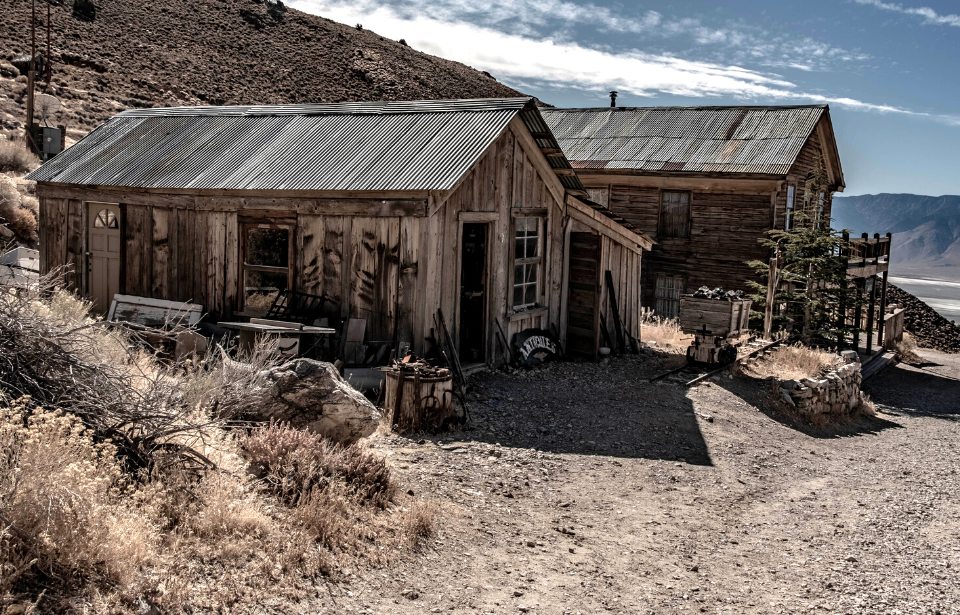In a world full of hustle and bustle, it is hard to believe that someone would give up their life savings to purchase a neglected, crumbling ghost town. However, that is exactly what one man did. Leaving behind the world of finance and business to restore the ghost town of Cerro Gordo, this man hopes to turn his passion project into a thriving tourist attraction.
Cerro Gordo was once a thriving city
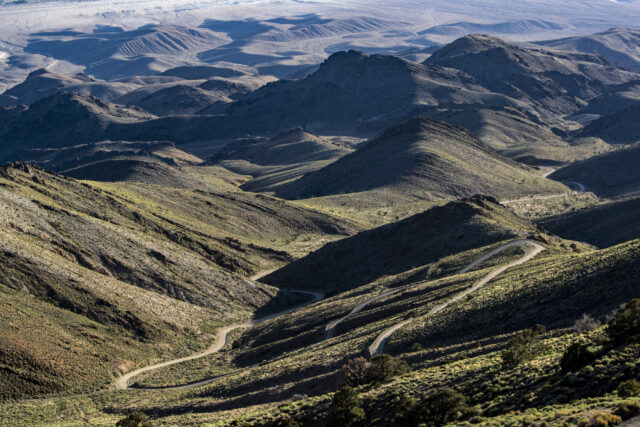
In 1865, prospector Pablo Flores discovered a vein of silver in the Inyo Mountains, and within two years, droves of prospectors made their way to the area to find their own riches through mining. The town erected there would be called Cerro Gordo, meaning “Fat Hill” in Spanish.
Located only three hours outside of Los Angeles, Cerro Gordo quickly became the largest and top producer of silver in California. Business in the town brought in so much wealth that in 1872, the Los Angeles News wrote, “To this city, Cerro Gordo trade is invaluable. What Los Angeles now is, is mainly due to it. It is the silver cord that binds our present existence. Should it be unfortunately severed, we would inevitably collapse.”
By today’s standards, Cerro Gordo would have generated $50 million over its rather brief history.
It was also extremely dangerous
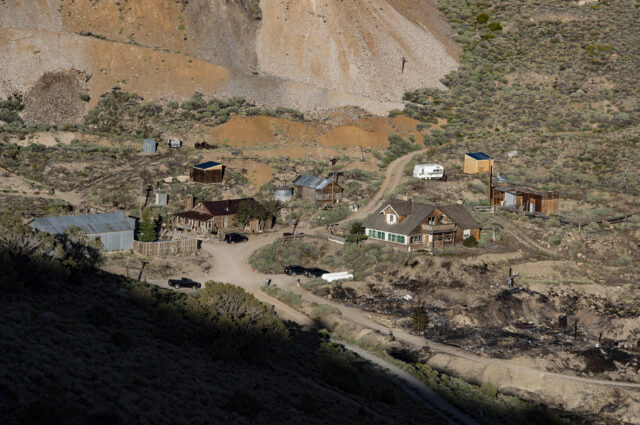
With its rapid expansion, Cerro Gordo also experienced a spike in violence, becoming one of the most violent in all of America at the time. Even before it became an established town, the area was steeped in violence. When five Mexican prospectors were searching the area, they were attacked by a group of Native Americans, killing three of them.
When the town was established, it was pretty clear what kind of business it was involved in. Of the 500 buildings that were erected, including multiple brothels and saloons, not one church or schoolhouse was built. It is believed that “there was a murder a week…” during Cerro Gordo’s peak, and even rumors that Butch Cassidy hid out in the town’s hotel.
The last reported gunfight to take place in Cerro Gordo was on December 29, 1892. Bill Crapo, a French-Canadian engineer who had served as the town’s postmaster, shot and killed the man who replaced him, Henry Boland, and his friend. Apparently, it was caused by an election dispute, and Crapo shot the men as they walked by his house, situated next to the town’s hotel. Their murders placed a $500 price tag on his head, one that people from neighboring towns tried to fulfill. Supposedly, Crapo disappeared, never to be heard from again.
Decline and resurgence
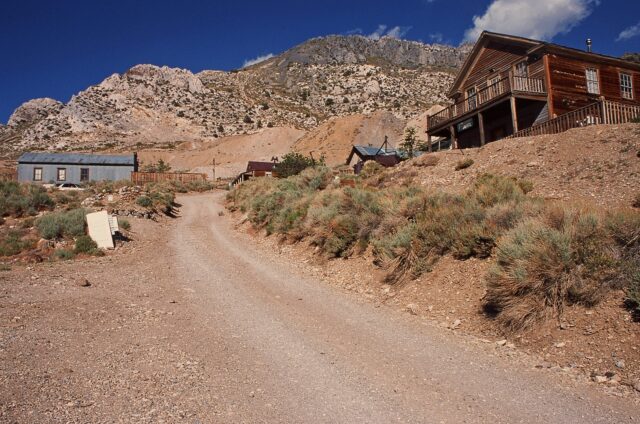
Unfortunately, the excessive wealth the town was experiencing was not to last – by 1880, the silver had run dry. Within just a decade, the 4,000 residents that lived there had abandoned the area.
In the early 1910s, Cerro Gordo experienced a second, smaller resurgence after zinc was discovered in the hills. However, this, too, was short-lived, and the last resident of the town left, leaving the place entirely deserted by 1938. The ghost town sat uninhabited and untouched for over half a century.
Purchasing the town and future plans
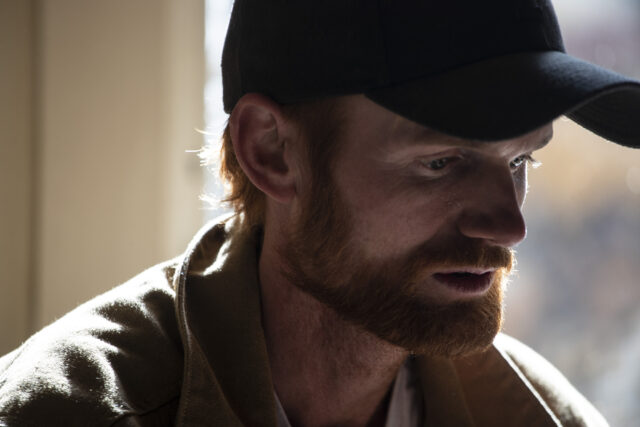
The story of Cerro Gordo doesn’t end there, though. In 2018, entrepreneur Brent Underwood and some other investors purchased the abandoned ghost town. The 336 acres and its 22 dilapidated buildings came at a whopping price of $1.4 million.
The intent behind purchasing Cerro Gordo is to slowly restore the town to its former glory and transform it into a tourist destination. Along with restoration, Underwood intends to build a museum where he will display all of the various things he finds as he explores the area.
The fire at the American Hotel
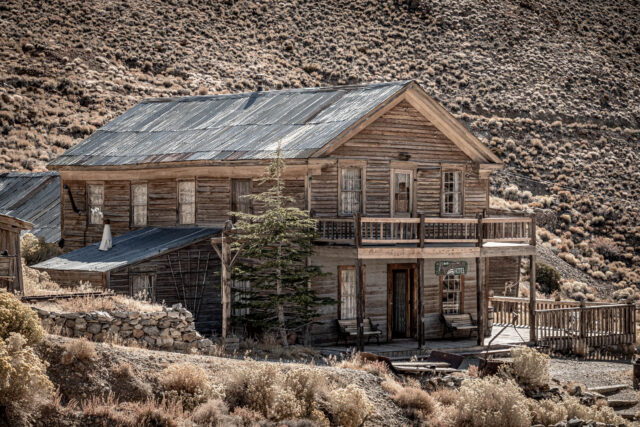
While the restoration process has been and will continue to be a long process, Underwood has come into his fair share of snags along the way. Rife with unexpected problems, returning the town to its glory hasn’t been easy.
One of the buildings Underwood hoped would be the jewel of the town was the American Hotel, believed to be the oldest hotel in California east of the Sierra Nevada. Sadly, while Brentwood has been living in the ghost town, exactly 149 years after it had opened, the American Hotel burned down in a fire.
The cause of the fire is unknown, but Underwood has a pretty good idea as to what could have caused it. He believes it started from an electrical issue, as century-old wiring ran through the building. That combined with the aged, dry wood of the structure and its newspaper insulation, the American Hotel was a sitting duck for the devastation caused by fire.
The fire extended beyond the hotel and reached both the ice house and Crapo’s former residence. “It was probably the most devastating day of my life,” Underwood explained. “I couldn’t even talk about it for the first few weeks. You are literally watching your life savings and hopes and dreams burn in front of you.”
Documenting the journey
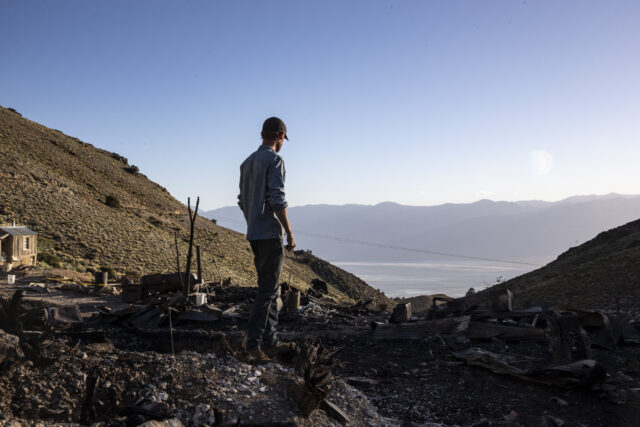
Soon after purchasing the property, Underwood made the life-changing decision to live in the abandoned ghost town while executing the restoration process. With this, he also began documenting his journey, posting videos showcasing tours of the town, what life is like living in a ghost town, and his various explorations in the area.
Unsurprisingly, his adventures in Cerro Gordo have gained quite a lot of traction, with his YouTube channel reaching 0ver 1.6 million subscribers and his TikTok reaching over 3.1 followers.
“The town has become what I’ve dedicated my life to,” Underwood explained. “I think the history of Cerro Gordo is important and I think preserving it and allowing more people to experience it is important. YouTube and TikTok are allowing more people to learn about the town and I think that’s awesome.”
His social media exposure has really boosted his fundraising for restoring the town, with his campaign to rebuild the American Hotel hitting over $120,000 of its intended $500,000 goal.
While the town isn’t ready to be opened to the public, Underwood has granted permission to some select influencers who have also helped to spread awareness of his Cerro Gordo restoration project. For Underwood, he’s in it for the long haul. “I don’t have an exit plan. Dying here is the exit plan,” he said.
